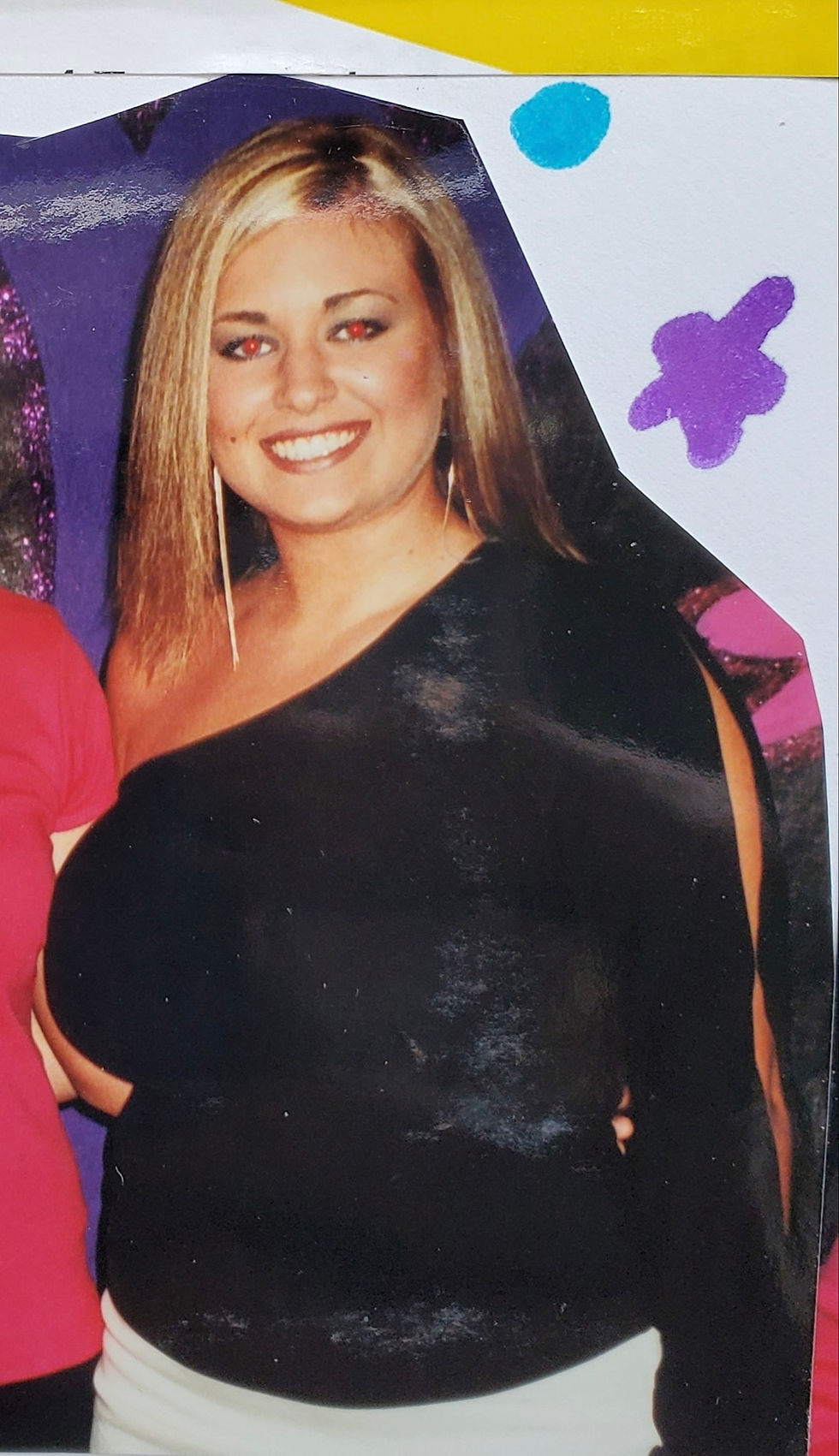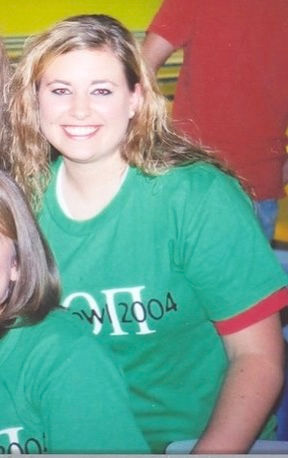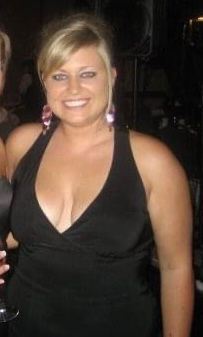Today concludes National Eating Disorder Week and I want to talk about body image and disordered eating. Three out of every four women have disordered eating. I am one of the three. (Titled edited because how could I have missed this shining opportunity to stay on theme)
The first time I can remember binge eating, I was 10 years old. I was at my grandmother's house; we had gathered for a family holiday meal. After everyone was finished eating and sitting around the table, I tried to sit with the adults and join their conversation. Swiftly, I was redirected and encouraged to go play. I didn't really have cousins close in age and I found nothing appealing about playing with my brother, so I walked into the kitchen and snagged a crescent roll. I think I ate almost a dozen while the kids played and the adults talked. I was nervous that the adults would find out how many I had eaten, so I grabbed a few each time and ate them in private. I remember feeling my stomach stretch to fit the food inside and even though I was uncomfortable, I kept eating. It was like I couldn't stop. It is, at times, still hard to stop.

I grew up in the 90s, when the beauty standard revolved around thinness. Moreover, there wasn't a body positivity movement - you either met the standard or struggled in pursuit. As a lifetime member of the latter category, I felt frustration with my body from an early age. Inundated with images of thin women with bones protruding, I resented my body and its inability to conform. My early onset binge eating resulted in stretch marks before I even entered middle school. I was ashamed because most other kids didn't have those. I had them on my legs, my breasts, my stomach - it's like I was busting at the seams.When I started menstruating in sixth grade, my physical development kicked into high gear. Everyone noticed and suddenly I was pair of tits instead of a child. A classmate snapped my bra in the cafeteria once; it was so loud that kids from other tables turned around and laughed at me. I was mortified. Adults told me this kind of attention would happen for the rest of my life, that it was some form of flirting. I was devastated. I hated that I couldn't control my body and this was the kind of attention it garnered. This was around the same time that we were learning about adulthood in Home Economics and I remember one lesson was dedicated to eating disorders. I wanted one after the lesson because the images were of all the same bodies that were in magazines and on TV and those girls weren't getting their bras snapped; they didn't even need to wear bras. They were thin and that entitled them to positive attention and flirtation, unlike what my body deserved. I decided that an eating disorder was how I could manipulate my body to be pretty (read: thin) and it all seemed very logical to my 12 year old mind. My body was a tool, to be manipulated, so others would find me attractive and therefore worthy of love. But I resented my options; I couldn't stop eating because I loved food and I couldn't purge because I hated to vomit. Binge eating was really only talked about in the context of purging and since I couldn't do that on command, I clearly couldn't have an eating disorder. I felt disappointed. Middle school logic...
I have always had a healthy appetite, but when I started growing away from childhood and into womanhood, that was not something to celebrate. Adults were always complaining about their weight while simultaneously bullying the bodies of others as a way of validation; I hate mine but it isn't as bad as yours kinda thing. "I'm so fat; God, I look disgusting. I am such a pig for eating that. I should skip lunch." And those who did skip lunch were celebrated. The mantra: "Food will never taste as good as skinny feels." (Clearly Kate Moss never had the beef tenderloin pizza at Boston's Mistral, but I digress.) If I wanted others to like me, I needed to lose weight. That's when my relationship with food really became disordered. I started the Atkins diet when I was 14 years old. In hindsight, there's irony in that choice because for almost a decade, later in life, I became a vegetarian; we'll get to that in a minute. But for two weeks in the ninth grade I only ate bacon and scrambled eggs. I lost about 10 pounds and was so proud of myself; I weighed 130 pounds. Of course, the Atkins diet isn't sustainable so when I went back to my established eating habits I gained those 10 pounds back. My body continued to develop and get curvier. This was frustrating for me because I didn't want curves, I wanted to be thin. I hated the curves that I couldn't control so I obsessed over the ones I thought I could. I obsessed over my stomach and how it rolled when I sat down; it has always been my least favorite body part. I hated my thighs because they flattened so much when I sat down. I hated that my forearms were larger than the other girls my age and you couldn't see my vestigial muscle. I wanted to wear a crop top and not feel embarrassed that my stomach was soft with rolls. Curves meant I had to censor my clothes. No low-cut or tight clothing; nothing revealing."You'll give men the wrong impression." This was a big point of contention for me and I would feel so frustrated and angry that I couldn't wear what everyone else was wearing, all because I had curves. Curves, controllable or not, were controlling me. I was being punished and hated my body more than ever.
College was when my relationship with food really went off the rails. I was like an unsupervised toddler - I ate and wore whatever I wanted because no one could tell me I couldn't. In some ways, it was liberating. I found comfort and joy in food and always looked forward to eating but I also felt shame for eating when I was expected to show restraint, which was all the time. I became embarrassed about eating in front of others because I worried they were thinking what I heard adults say behind each others' back: "Wow, she's as big as a house. She should skip a few meals. She's as wide as she is tall." Sophomore year, I got sick with mono and a staph infection in my throat. I lost a lot of weight because I couldn't swallow and didn't have the energy to eat. I remember a professor praised me for "trimming down"; unsolicited. When I told him I had been sick, he mentioned that it only mattered how I looked now. I was partially disgusted and partially proud; at least others thought I looked good.

However, I wasn't able to keep the weight off. I resented my body for expanding, yet again. So, I started smoking; I was 20 years old. When I felt hungry, I would smoke a cigarette and drink a Diet Coke - and I lost some weight! I lived with roommates who were smaller framed and envied their bodies so I would skip meals throughout the day then binge when I got hungry at night. I leaned further into the mindset that bodies were meant to be manipulated and not loved. I had to change my body because it was the root of all my problems; it made men sexualize me, made people stare at me, made me less worthy of love. The problem was my body and if I couldn't control my eating, there were other things I could control. "You aren't fat, you just have big boobs." So, I decided to have a breast reduction; I was 21 years old.

I remember waking up from surgery and hating my body even more. I had not stopped smoking so my areolas didn't heal evenly. My breasts were now slightly different in shape from each other from the incisions underneath. My nipples were uneven. I felt butchered, unattractive, and depressed with my irreversible decision. Everyone convinced me I had made the right choice, but I was regretful so I found comfort in old habits - food. The irony is that because my weight fluctuated so much post-op, my breasts filled back up over the years. Mentally, I felt some comfort in the familiar; physically, I was ashamed. I couldn't even be fixed with plastic surgery. My body was hopeless. My friends said "your tits are resilient!" and it was funny but I felt like a failure. I started to gain again. I remember working a retail job at the time and a customer once asked me when I was due; unsolicited. I was humiliated; I cried as soon as she walked away and clocked out early from my shift. It quite literally ruined my day. I was so fat people mistook me for being pregnant, adding insult to injury; at least pregnant women have a reason for gaining weight. I binged that night. The next day I felt incredible shame. To cope, I dug further into the manipulation; I could outsmart (read: punish) my body. Thus began a pattern of crash diets, binge eating, and resenting myself for not being able to keep the weight off.

I became a vegetarian after I graduated college, but even cutting out an entire food group didn't help me lose weight permanently. I tried Weight Watchers, Atkins, Keto, Macros, diet pills, intermittent fasting, skipping meals; this isn't an exhaustive list but you get the idea. I would lose the weight and then go back to my old eating habits because my body was desperate for nutrition and sustenance; every time I would gain weight and start the cycle over again. "Be more active!" So, I tried every exercise program I could rationalize. I ran half marathons, lifted heavy weights; yoga; pilates; cycling; I never found a sustainable weight loss solution. This cycle continued for over a decade. I would receive compliments from friends and family about how good I looked every time I lost weight, but what I lost was never enough. "Don't stop, keep going! You look so good, but you'd look better if you lost about 5 or 10 more." My weight impacted how I viewed myself, my relationship with others, and the quality of partners I chose. I did not believe I was worthy of love because I was not thin; if I'm really honest that feeling still lingers. I distinctly remember my ex-fiancé telling me, as he expressed his loss of feelings, that if I could just lose the weight he might love me again. Spoiler alert: I lost the weight and he didn't.
I've written about my blood clot, subsequent surgery, and lengthy hospital stay; if you missed it, check out my other posts. When I was discharged from the hospital, my doctor told me there weren't any foods on the restricted list; I could eat whatever I wanted. That was the only sign off I needed to justify binging as my primary coping mechanism, even if it was subconscious at the time. In my defense, I couldn't eat for the entire month I was hospitalized so cut me some slack. My brain and body had been in survival mode for so long that I embraced the opportunity to simply exist. But existence eventually led to indulgence. Old habits die hard and, coupled with a pandemic, my primary source of joy was food. I've struggled with the tense of that last sentiment because some days I think I've overcome my binge eating and other days I know I haven't. If I'm being completely transparent, I struggle with binge eating every day and these last two months have been especially challenging.

I wish I could conclude this post by telling you I'm better, have a healthy relationship with food, life is great and it can be for you too; but, that wouldn't be the truth. Life is great and I hope it is for you too, but I'm not fully healed. I'm still on my journey of self-discovery and I promised I'd bring you along for the ride; seatbelts are encouraged. Rewiring your brain after decades of trauma, body dysmorphia, and untreated mental illness is hard and takes time. Healing is not linear and it is interwoven with grief. Grief of the life you might have had if you had realized your disorder sooner. Grief that you have to work harder than others just to operate normally around food. Grief for all the times of weakness when you promised yourself the last time was the last binge. Grief for the pain you feel mentally and physically when meals turn into negotiations. Grief for the body you will never have; if I thought I hated my stomach before, I had no idea how much deeper a nine inch scar could cut me. While it's a reminder of resilience, it's also a reminder of pain and suffering; another unsolicited scar on my patchwork body. I'm proud of my body for surviving a near death experience, but some days it's hard to see her in the mirror and be reminded of how hard she's struggled. I want to love my body. I'm trying to love my body and feel like I'm getting closer; but every broken promise to eat at home, every dessert, every shirt that suddenly fits tighter than before impales my confidence. When does this get easier? Somedays I worry it never will...
But other days I walk further through the healing tunnel and love myself a little more, even if I ate more than I wanted to that day. I remind myself that my eating disorder is a comorbidity to other mental illnesses and I have to approach healing my relationship with food holistically. I have to fix all of me, not just the parts where I desire the most change and the longer I procrastinate, the harder it is to finish. I've always defaulted to eating my feelings, but I hear it's healthier to talk about and try to feel them. So here I am, writing all of this down and sharing it with the world because in some weird way I think it helps. It makes me feel less alone and if you're reading this - thank you. There are moments when I want a do-over; to go back in time and say to my younger self the words I wish I had heard sooner. But I can't, so instead I will offer it to you... in case no one has told you, recently or ever, your value as a human being has nothing to do with your weight, clothing size, or the number of people who find you physically attractive. You are allowed to exist and take up space; you do not have to shrink yourself to be any more worthy of life or of love. Eating disorders, like bodies, are a spectrum and your experience is valid even if it doesn't look how society says it should. I know how hard it is to struggle with your weight and the mental implications of weighing more than you've been told you should. Wherever you are on your healing journey, you aren't alone; but I hope you're making progress because you deserve a healthy relationship with food and your body even when the world tells you otherwise. You do not need to weigh less to matter more - you are enough, just as you are.
Do you know what disordered eating looks like? Did you know that eating disorders are a mental illness and more often than not, cannot be visually detected? If you or someone you love is struggling with disordered eating, you aren't alone and there are resources that can help. Please visit www.nationaleatingdisorders.org




Comentarios